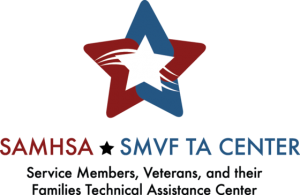
Why We Need to Consider Lethal Means and What We Can Do
June 28, 2018, 2:00–4:00 p.m. ET
Join SAMHSA for the first session in the Suicide Prevention Virtual Event Series focusing on strategies to prevent suicide among our service members, veterans, and their families (SMVF). This series will be hosted by SAMHSA’s SMVF Technical Assistance (TA) Center, in partnership with the U.S. Department of Veterans Affairs (VA). These sessions are designed to be both interactive and informative.
As communities develop comprehensive approaches to suicide prevention for SMVF, “means reduction” that is military culture informed is a critical component that must be considered. Session 1 in the Strategies to Reduce Suicide Among SMVF Virtual Event Series will feature Megan McCarthy, Ph.D., who will discuss military culture-informed strategies that can be used to reduce access to lethal means, including poisoning and firearms for individuals who are at high risk of suicide. While suicidal thoughts are most often brief and temporary, access to lethal means during times of elevated distress and risk too often translates fleeting thoughts of suicide into tragedy. This interactive session will focus on veteran-centered approaches to lethal means safety and include examples to help participants develop an effective strategy for reducing veteran suicide.
Learning Objectives
- Identify strategies for working collaboratively with SMVF for safe storage of firearms and medications
- Detail successful military culture-informed strategies for working collaboratively with veterans and their loved ones to develop individualized plans for the safe storage of medications and firearms
- Discuss available resources for veterans and families to minimize risk
Megan McCarthy, Ph.D. | Deputy Director, Suicide Prevention Programs, Office of Mental Health and Suicide Prevention, U.S. Department of Veterans Affairs
Dr. McCarthy serves as Deputy Director of the VA’s Office of Suicide Prevention. Her work focuses on the development of VA’s comprehensive public health approach to suicide prevention and on oversight of the office’s day-to-day operations. Dr. McCarthy is also an Assistant Health Sciences Professor in the Department of Psychiatry at the University of California, San Francisco School of Medicine. She received a Bachelor of Arts from Stanford University, where she studied philosophy and international relations, and a Doctor of Philosophy in psychology from the University of California Berkeley. She completed her doctoral internship at the San Francisco VA Medical Center and a postdoctoral clinical fellowship specializing in psychotherapy for underserved communities at Harvard Medical School.
Target Audience
Representatives serving SMVF from state, territory, and tribal behavioral health systems; community health care providers; suicide prevention coordinators; mental health and addiction peers; military family coalitions and advocates.
Register for the Webinar
Please note:
- The event will be hosted on a WebEx Platform and participants are asked to test their system before the broadcast
- The webinar archive will be made available to registrants after the webinar
- Continuing education units are not available for this webinar
If you have any questions about your registration, please contact Philip Paty at (518) 439-7415, ext. 5272, or by email at ppaty@prainc.com.
Mark Your Calendars for Sessions 2 and 3
Session 2 – Building a Protective Environment with Whole-Person Care, featuring Ajay Manhapra, M.D., Lead Physician, Advanced PACT Pain Clinic, Hampton VA Medical Center, Hampton, Virginia
July 18, 2018; 2:00-4:00 p.m. ET
How do care providers navigate the challenges of managing chronic pain while avoiding addiction among SMVF? What is the link between chronic pain and suicidality? What is a protective environment and how do you create one for the SMVF in your care? In this session, Dr. Manhapra will explore the importance of comprehensive whole person care in creating protective environments for veterans that reduce both addiction and suicide.
Session 3 – Acute Care Transitions: What Works, featuring Richard McKeon, Ph.D., M.P.H., Chief, Suicide Prevention Branch, Division of Prevention, Traumatic Stress, and Special Programs, Center for Mental Health Services, SAMHSA
August 6, 2018; 1:00-3:00 p.m. ET
Research reveals that the risk for suicide attempt or death increases significantly in the 30 days immediately following discharge from Emergency Departments and inpatient psychiatric units. Dr. McKeon’s presentation will focus on improving post-discharge safety and address how crisis service system follow-ups have proven successful. |